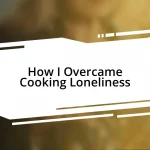Key takeaways:
- Cooking for oneself is an act of self-love, offering emotional comfort and a way to express personal creativity.
- Meal planning and using the right kitchen tools enhance the cooking experience, making it enjoyable and efficient.
- Exploring new recipes and embracing failures are essential for skill mastery, fostering a mindset of curiosity and experimentation.
- Creating a relaxing cooking environment, including ambiance and organization, transforms cooking from a chore into a joyful ritual.
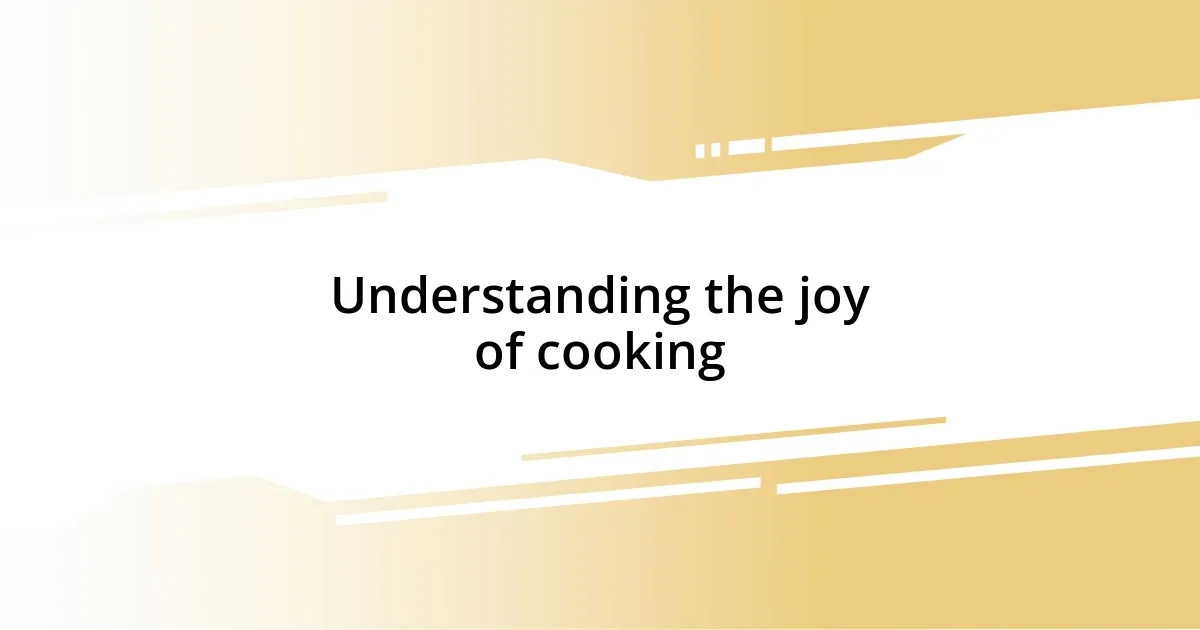
Understanding the joy of cooking
Cooking for myself has always felt like a little act of self-love. I remember one rainy afternoon, I decided to try my hand at a hearty vegetable stew. As the aroma filled my kitchen, I felt a wave of comfort wash over me, reminding me that food can provide not just nourishment, but warmth and solace in challenging times. Have you ever noticed how certain meals can evoke cherished memories or emotions?
There’s a certain thrill that comes with experimenting in the kitchen. I once had a thrilling yet nerve-wracking experience trying to bake my first homemade bread. I can still recall the mix of anxiety and excitement as I watched it rise in the oven, transformation happening right before my eyes. That moment taught me that cooking isn’t just about the end product; it’s about the journey, the mistakes, and the delightful surprises along the way.
What truly brings joy to my cooking experience is the freedom to express myself. I’ve found that adding my personal twist, like a sprinkle of unexpected spices or a creative flair on plating, makes each meal resonate with my personality. When I cook, it feels like I’m telling a story, sharing a piece of myself in every dish. It’s a celebration of my tastes, my choices— and isn’t that what makes cooking for oneself such a fulfilling pursuit?
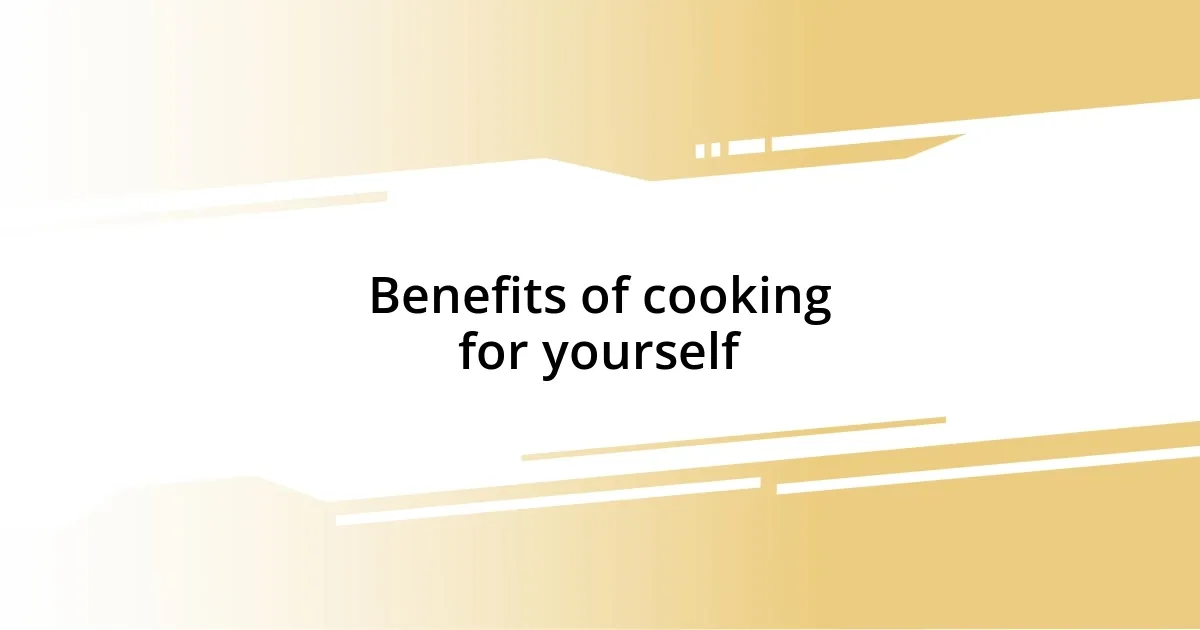
Benefits of cooking for yourself
Cooking for myself offers numerous benefits that often go unnoticed in our fast-paced world. For me, the most rewarding aspect is the control over what I consume. I remember one evening when I substituted a heavy cream sauce with a light yogurt alternative in my pasta dish. Not only did it taste refreshing, but it also made me feel lighter and energized afterwards. I’ve discovered that through cooking, I can tailor my meals to suit my health goals, mood, or cravings, all while indulging in that essential culinary creativity.
Here are some benefits of cooking for yourself:
- Healthier Choices: I can select fresh ingredients and control portion sizes, leading to a more balanced diet.
- Cost Efficiency: Cooking at home often saves money. I used to underestimate how much I could stretch a bag of lentils—making savory soups that lasted days!
- Skill Development: Every meal is a chance to refine my cooking techniques. I’m always mastering new skills, whether it’s chopping vegetables efficiently or trying new cooking methods.
- Mindfulness: The process of cooking serves as a form of meditation for me. I find that chopping herbs or stirring a simmering pot can be incredibly calming after a hectic day.
- Creativity: Every dish is a canvas. I once made a spontaneous dish with leftover veggies and spices just because I wanted to see what flavors would meld together. The result was surprisingly delicious!
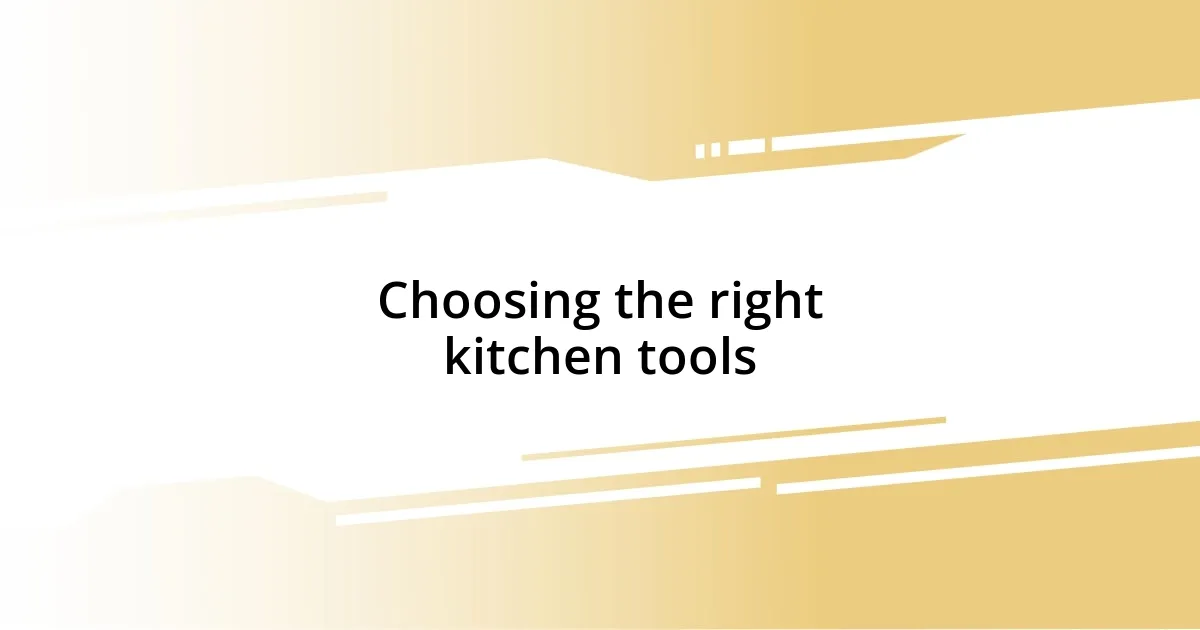
Choosing the right kitchen tools
Choosing the right kitchen tools is crucial for enhancing the cooking experience. I’ve found that having the right tools can turn a daunting task into a pleasurable one. For instance, investing in a good-quality chef’s knife dramatically changed the way I approach meal prep. The ease of slicing through vegetables not only cuts down my cooking time but also makes me feel more accomplished and confident in my abilities.
I also love to explore gadgets that promote creativity in the kitchen. A spiralizer, for example, opened up a world of fun dishes for me. I can transform zucchini into noodles, bringing a fresh twist to traditional pasta. It truly adds an element of excitement to my cooking, allowing me to experiment and feel like a culinary artist.
As I’ve gathered various tools over the years, I’ve learned to prioritize quality over quantity. A reliable set of measuring cups is essential, but so is a good non-stick skillet that makes cooking eggs a breeze. The right combination of tools not only enhances my efficiency but also sparks joy in the act of cooking, making each meal feel special.
| Kitchen Tool | Importance |
|---|---|
| Chef’s Knife | Essential for precision and ease of cutting |
| Spiralizer | Enables creative dishes with vegetables |
| Non-stick Skillet | Great for easy cooking and cleanup |
| Measuring Cups | Necessary for accurate ingredient quantities |
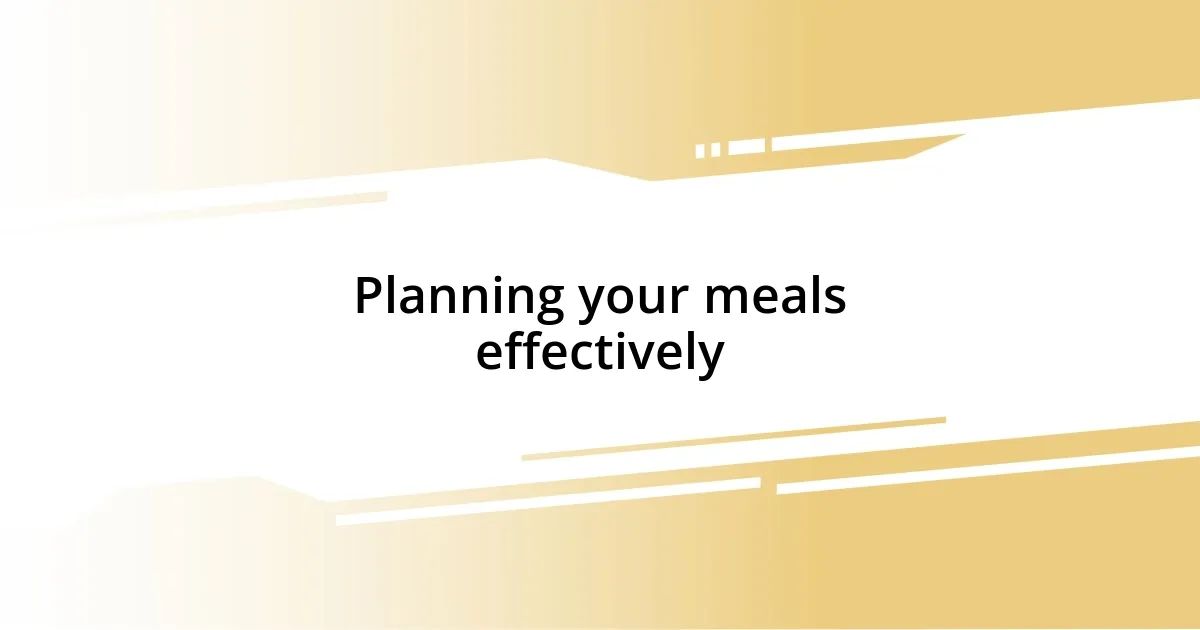
Planning your meals effectively
Planning meals effectively is a game-changer in my cooking journey. I can’t tell you how many times I’ve ended up with a fridge full of random ingredients that seemed appealing at the time but didn’t translate into a cohesive meal plan. Now, I take a moment each week to jot down what I want to eat, which not only streamlines my grocery shopping but turns cooking into something I eagerly anticipate. It’s like a treasure hunt, picking just the right ingredients to create the week’s culinary adventure.
One of my favorite strategies is theme nights—think Taco Tuesday or Stir-fry Friday. It spices up the week and keeps me excited about cooking for myself. I remember last month when I decided to make Wednesdays “Mediterranean Night.” I whipped up a tabbouleh salad, grilled chicken skewers, and hummus from scratch. It felt incredible to sit down to such a flavorful meal, knowing I’d planned it all out ahead of time. Plus, having a theme makes decision-making so much easier; I simply ask myself, “What fits into this theme?”
Ultimately, I’ve found that meal planning also saves me from unhealthy last-minute choices. I used to succumb to takeout when I was tired or busy. By setting aside time to plan, I’ve developed a sense of discipline. Now, when I reach for those takeout menus, I remind myself of the satisfying feeling I have after cooking a nutritious meal that’s bursting with flavor. Has planning your meals ever brought you that sense of accomplishment? For me, it’s not just about the food; it’s about nurturing a healthier relationship with my kitchen.
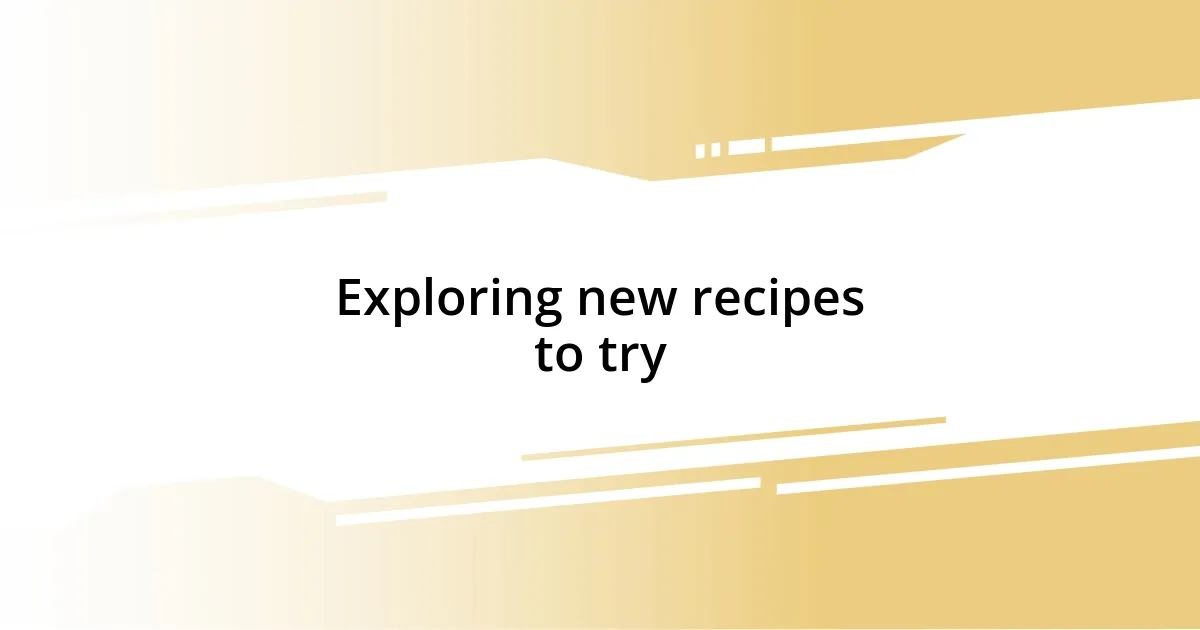
Exploring new recipes to try
Exploring new recipes can feel like embarking on a delightful adventure in my kitchen. I remember one Saturday morning, I stumbled across an intriguing recipe for homemade sushi. The thought of rolling my own sushi filled me with excitement and a bit of trepidation. But after gathering the ingredients, laying everything out, and following the steps, I found myself amazed by the delicious results. It was a moment of triumph that fueled my desire to keep trying new things.
There’s something incredibly satisfying about flipping through cookbooks and scrolling online to discover a dish I’ve never tried before. I often ask myself, “What flavors am I craving today?” Recently, I found a vibrant Moroccan tagine recipe that called for spices I had never used. The aroma that filled my kitchen while simmering was unlike anything I had experienced before, and it transformed an ordinary weeknight dinner into something truly special. Every new recipe becomes an opportunity to learn and grow, and I can’t help but feel exhilarated by the creative process.
Every attempt to cook something novel teaches me not just about food, but also about myself. I realized that recipes are not just instructions; they’re invitations to experiment. When my first attempt at a chocolate soufflé nearly turned into a disaster, I laughed it off, reminding myself, “It’s all part of the journey.” Now, I approach each culinary challenge with curiosity, knowing that the best memories are often made when things don’t go exactly as planned. Have you ever found joy in a cooking misstep? I find that some of the best dishes come from a spark of spontaneity, and that’s what keeps my love for cooking alive.
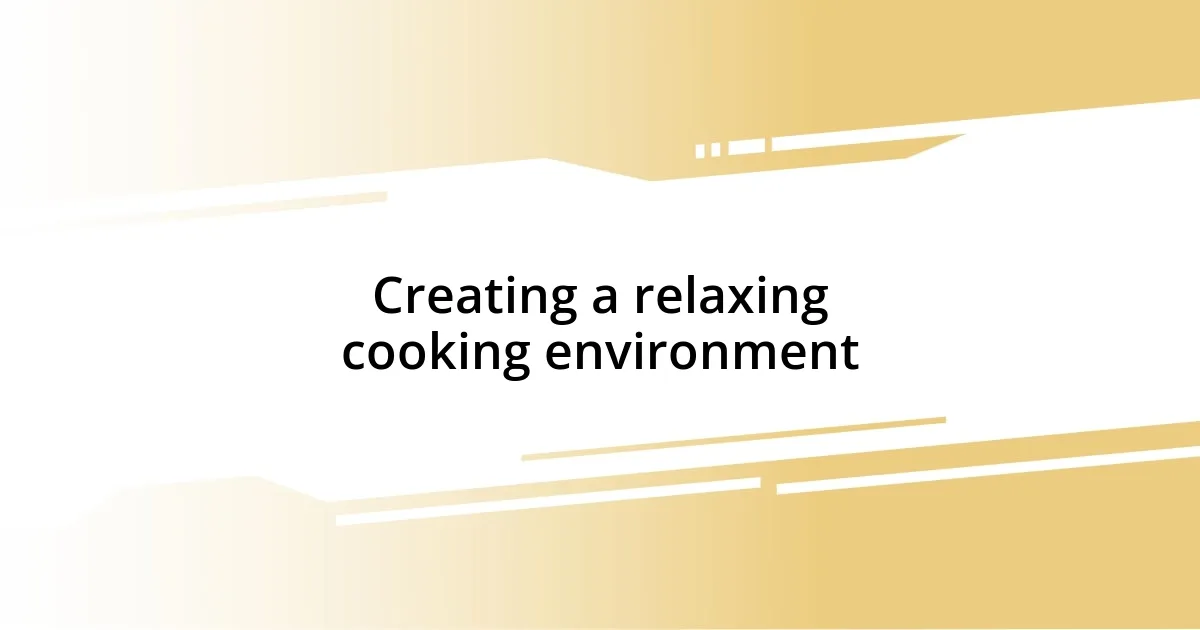
Creating a relaxing cooking environment
Creating a relaxing cooking environment can transform the whole experience into something enjoyable rather than a chore. For me, it starts with decluttering the kitchen; I can’t focus on making a great meal if I’m surrounded by mess. I also love to set up a little ambiance—maybe I’ll light a candle or pop on some upbeat music. It’s amazing how these small changes can shift my mood and make the space feel inviting.
Another aspect that contributes significantly to my cooking atmosphere is having all my tools and ingredients at hand. The other night, when I wanted to whip up a comforting pasta dish, I prepped everything in advance. Chopping veggies and measuring out spices beforehand not only speeds up the cooking process but also adds to the relaxing vibe. Have you ever noticed how prepping can almost feel like a meditative practice? It allows me to immerse myself in the moment, focusing each chop and slice with care.
Lastly, I’ve learned the importance of cooking at my own pace. I used to rush through meals, thinking I had to meet some imaginary deadline. Now, I savor the process. I remember a cozy Sunday afternoon when I took my time making a hearty vegetable soup. Instead of hurrying, I let the flavors develop, stirring slowly while sipping on a warm cup of tea. This leisurely approach truly turned cooking into a joyful ritual, one that nurtures both body and soul. How do you make your cooking space a sanctuary? Finding that personal touch can unlock a world of culinary happiness.
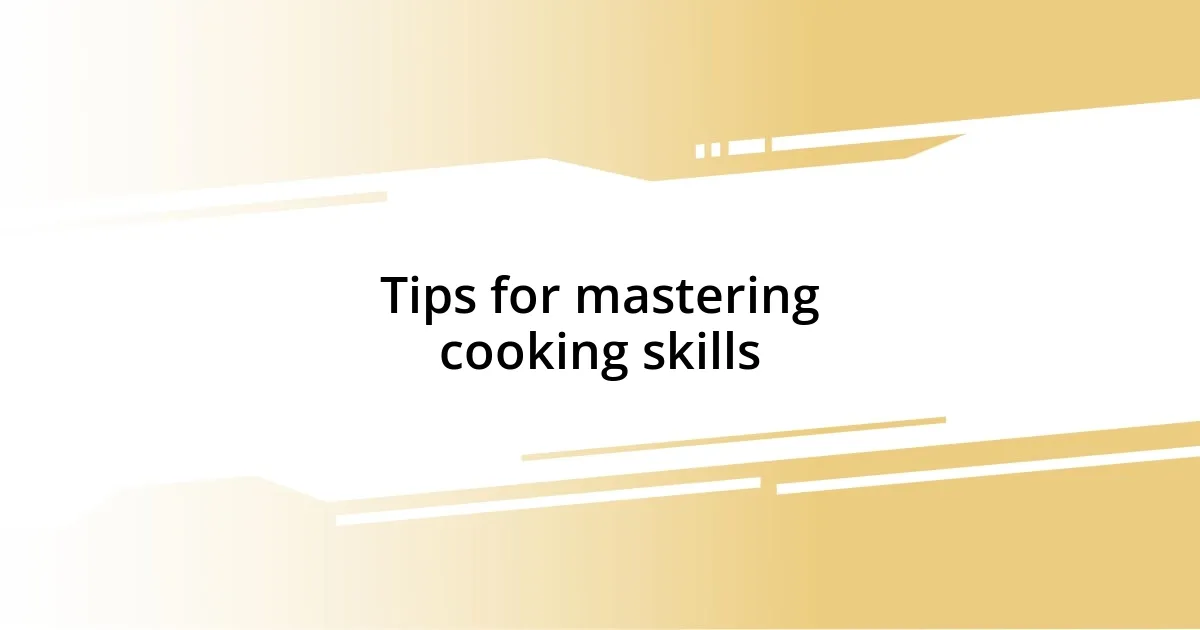
Tips for mastering cooking skills
To master cooking skills, practice really is the key. I remember when I first tackled the art of knife skills—my fear of cutting myself was palpable. But with each slice and dice, I learned to respect the knife and, eventually, gained confidence. Have you ever noticed how, with repetition, tasks that once felt daunting become second nature? Over time, I found that consistent practice made cooking feel like an enjoyable dance rather than a clumsy struggle.
One of the best tips I’ve discovered is to embrace failure. There was a time I attempted to bake bread from scratch. It was a total flop—the bread didn’t rise, and I was left with a flat disappointment. At first, I felt defeated, but that experience taught me so much about yeast, gluten, and patience. I now view each culinary mishap as an opportunity to learn. What if your next kitchen mistake turned into your best lesson? Shifting my perspective in this way has seriously transformed my approach to cooking, making it feel like a playful experiment rather than a performance.
Lastly, I find that connecting with other cooks has a powerful effect on my growth in the kitchen. Sharing recipes and tips with friends ignites my passion like nothing else. I’ll never forget a dinner party where we all brought our favorite dishes and talked about the cooking techniques behind them. The conversations sparked new ideas and helped me see familiar ingredients in a new light. Have you ever shared a cooking moment that deepened your love for it? That sense of community can be incredibly enriching, turning the cooking process into a collaborative and joyful experience.














